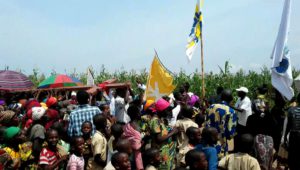The government and religious leaders have created an authority that will monitor, regulate and settle religious matters. The organisation has generated controversy, with some worrying about the future of state-church relationships.

Catholics carrying a cross in a religious ceremony.
The Ministry of Interior and Civic Education has set up a body with the primary mission of settling intra- and inter-denomination disputes, ensuring religious organisations operate according to the law and tracking subversive teachings and reporting the authors to the Ministry.
Burundians opposed to the new Body of Control and Conciliation of Religious Denominations are concerned that it will be used as a political tool for curbing freedom of expression and clamping down on dissent.
The one religious group notably absent from the body is the Catholic Church, which represents over 60% of the population and has fallen out with the government over President Nkurunziza’s third term. The Minister of Interior says it is because Catholics did not suggest a candidate. However, he claims that according to talks he had with a delegation of catholic bishops, the Catholic Church understands the need for the body.
Eight of the 11 members of the body are religious leaders. The Minister of Interior and Civic Education, Pascal Barandagiye, says that these leaders are better placed to address religious issues than officials of the Ministry are, who used to deal with such matters.
Disputes in religious organisations often involve disagreements over leadership and material possessions.
“We cannot claim that solutions we used to offer for religious issues were satisfactory. Members of the denominations understand the issues better than we do. That’s why we have handed the matters over to them”, says the Minister.
The Minister says that even though there are differences in doctrines of different denominations, “they all teach peace, love, security and respect of the authority. No one can teach rebellion, immoral behaviour or any other behaviour that is against the decencies of the Burundian society”.
When it comes to controlling teachings, “the body will have not barriers”, says the Minister. “It will even use intelligence to gather information”.
The need for such a body stems from the recognition of the impact religious organisations can have on development, peace, unity in the vastly religious east African country.
Minister Barandagiye says that there are some religious teachers who fail to keep up the good work and “convey false messages likely to create disorder and troubles in the country”.
Over the last few months, the government has banned major civil society organisations that it accused of not abiding by their status and carrying out activities that were harmful to the State and the Burundian people.
Mixed opinions over the Body
Claude Bigirimana, who says he is a born-again evangelist, praises the setting up of the body. He calls on the members to work by God’s Word and in love, meekness and understanding.
He says religious teachers should avoid meddling with politics and just focus on spiritual matters. “Leading a church is different from leading a country”, he says, “Religious teachers should focus on teaching people not to sin. When people avoid sinning they become law-abiding citizens”.
Another evangelist, who identifies himself by his surname Jacques, says it’s a good thing that the government set up the body because there may be “divisions and disputes over money or other things” in religious organisations.
However, he worries about which teachings can be labelled as seditious. “The law of the king may conflict with the law of the King of kings”, he says, “I fear some people might be jailed or be accused of rebellion when in fact they are not”.
He says that for example a “prophet” who transmits God’s message might be summoned to give an account for what God has said, something that is “impossible”.
For others like S.G., the idea of monitoring religious teachings is “the reign of terror”.
Religion blended with politics
The core of the body is more political than spiritual. The Minister of Interior says the body respects the constitutional ethnic and gender quotas of 60% Hutus against 40% Tutsis and 70% of men against 30% women. Three members are officials from the Ministry of Interior and Civic Education.
The body was provided for by the 2014 law on the organisation of religious denominations that was intended at controlling the proliferation of churches in the more than 90% Christian country.
The law, that was judged by some rights groups as intended to limit religious freedom, stipulates that, for example, to be a leader of a church one has to hold a BA degree and that there must be at least 500 initial members to start a new church.
Burundi is a lay republic according to the Constitution. However, religion is pervasive in the discourse of even the higher ranking authorities. For example, President Nkurunziza, a born-again Christian just like the First Lady who is a Pastor, claims he received prophecies of becoming president long before he first entered office in 2005.
In 2015, the Catholic Church in Burundi publicly opposed President Nkurunziza’s bid for a third term in office.
In recent years, there have been a number of both Burundi nationals and foreigners who have claimed to hold “prophecies” about the future of the country. The “prophecies” warn of apocalyptic events that will precede a revolutionary new Burundi.
More recently, on 31 December 2016, at the closing of a week-long religious celebration that the President and the First Lady organised, the President said that “God’s voice is going to shake the earth and the heaven because of Burundi”.



















 IWACU Open Data
IWACU Open Data

